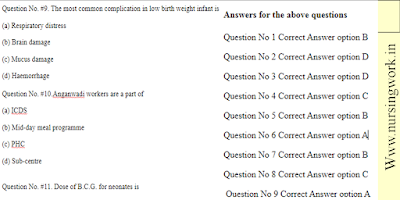22 Important Nursing Questions asked in many Exams
22 Important Nursing Questions with answers published here is asked in many Exams repeatedly. Refer other Questions available in this blog for getting success in upcoming Nursing Staff Recruitment Examinations
Question No. #1. Male type of pelvis is called
(a) Gynaecoid
(b) Android
(c) Anthropoid
(d) Platypeloid
Question No. #2. A condition in which blood pressure is elevated over 140/90 mm of Hg after 36 weeks of
pregnancy is called
(a) Eclampsia
(b) Hypermesis gravid arum
(c) Essential hypertension
(d) Pre-eclampsia
Question No. #3. Normally foetal heart beat is
(a) 92 to 100 irregular
(b) 100 to 120 regular
(c) 120 to 140 irregular
(d) 120 to 140 regular
Question No. #4. Internationally, low birth weight is defined as birth weight of less than
(a) 4.5 kg
(b) 3.5 kg
(c) 2.5 kg
(d) 1.5 kg
Repeated Question KEA Nurses Recruitment Exam
Question No. #5. Healthy babies, on an average double their
weight by
(a) 3 months
(b) 5 months
(c) 7 months
(d) 9 months
MOH Question Answers for Nurses
Question No. #6. For an infected HIV positive new born BCG vaccination
(a) Is contraindicated
(b) Dose should be doubled
(c) Dilution should be doubled
(d) Should be administered intramuscular
Question No. #7. A method of evaluating and recording the foetal condition at birth is by
(a) Vital statistic
(b) Apgar Scoring
(c) Weines Scoring
(d) Radiography
Question No. #8. Normally newborn lose weight in the first few days of life. A normal weight lose is
(a) 1% of birth weight
(b) 5% of birth weight
(c) 10% of birth weight
(d) 20% of birth weight
Question No. #9. The most common complication in low birth weight infant is
(a) Respiratory distress
(b) Brain damage
(c) Mucus damage
(d) Haemorrhage
Question No. #10.Anganwadi workers are a part of
(a) ICDS
(b) Mid-day meal programme
(c) PHC
(d) Sub-centre
Question No. #11. Dose of B.C.G. for neonates is
(a) 0.05 ml
(b) 0.1 ml
(c) 0.2 ml
(d) 1 ml
Question No. #12. The major route of transmission of hepatitis A is
(a) Feco oral route
(b) Parenteral route
(c) Sexual transmission
(d) Perinatal transmission
Railway Staff Nurse Exam Questions
Question No. #13. Neonatal tetanus most often manifests at
(a) Birth
(b) 48 hours
(c) 7th day
(d) 14th day
Question No. #14. Road to health indicates that a child at
(a) Free from disease
(b) Growing normally
(c) Completely immunized
(d) Mentally stable
Question No. #15. During labour the patient is sometimes
catheterized. The rationale is
(a) to prevent urinary stasis
(b) to encourage fetal descent
(c) minimize discomfort
(d) prevent the patient from having to get void
Question No. #16. Tests that should be performed for every
woman during antenatal care include
(a) Haemoglobin
(b) Test for syphilis
(c) Ultrasound of baby
(d) (a) and (b) only
Question No. #17. Immediate postpartum haemorrhage can be
due to
(a) Uterine atony
(b) Genital trauma
(c) Retained placenta
(d) All of the above
Question No. #18. Immediate care for a normal newborn includes
(a) skin-to-skin contact followed by placing
the baby in a warming inclement
(b) Drying the baby, removing the wet cloth,
and covering the baby with a clean dry
cloth
(c) Stimulating the baby by slapping the soles
of the baby’s feet
(d) Deep suctioning of the airway to remove
mucus
Question No. #19. Care of the umbilicus should include
(a) Cleansing with alcohol
(b) Covering with a sterile compress
(c) Clean and dry with sterile cotton/gauze
and leaving on covered
(d) Applying antibiotic ream
Question No. #20. Breastfeeding should begin
(a) After the baby’s first bath
(b) When the baby starts to cry
(c) Within the first hour following birth
(d) When the mother’s milk comes in
Asked in NHM CHO Recruitment Exam
Question No. #21. W.H.O. day is celebrated on
(a) 7th April (b) 7th August
(c) 7th June (d) 7th October
Question No. #22. The vandemataram scheme, is concerned with
(a) Patriotism in health profession
(b) Honesty in administration of health
programs
(c) Safe motherhood services
(d) Education at Primary school level
Answers for the above questions
Question No 1 Correct Answer option B
Question No 2 Correct Answer option D
Question No 3 Correct Answer option D
Question No 4 Correct Answer option C
Question No 5 Correct Answer option B
Question No 6 Correct Answer option A
Question No 7 Correct Answer option B
Question No 8 Correct Answer option C
Question No 9 Correct Answer option A
Question No 10 Correct Answer option A
Question No 11 Correct Answer option A
Question No 12 Correct Answer option A
Question No 13 Correct Answer option D
Question No 14 Correct Answer option B
Question No 15 Correct Answer option B
Question No 16 Correct Answer option D
Question No 17 Correct Answer option D
Question No 18 Correct Answer option B
Question No 19 Correct Answer option C
Question No 20 Correct Answer option C
Question No 21 Correct Answer option A
Question No 22 Correct Answer option C

Comments
Post a Comment